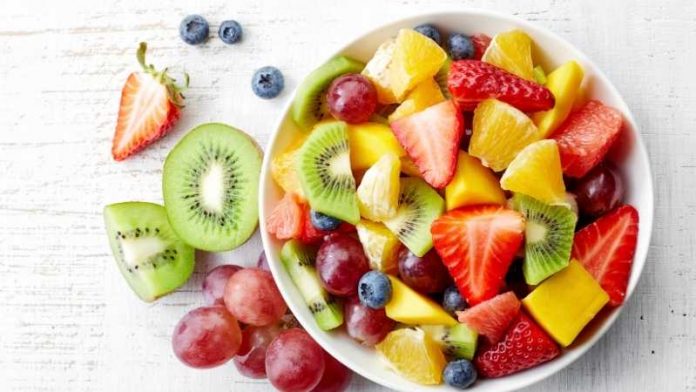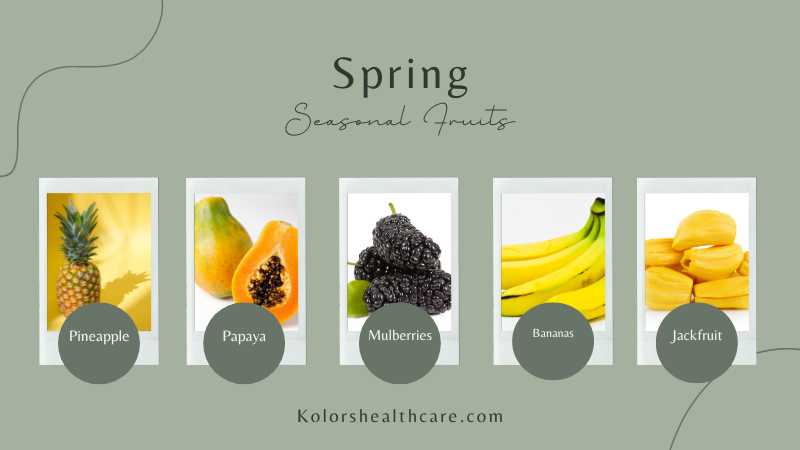
India enjoys a diverse climate that paves the way to four unique seasons around the year, each giving you an abundant source of fruits for every season to fill up your plates. From chilly winters and beautiful springs to scorching summers, these seasons play a key role in contributing to the country’s ancient culinary traditions and abundant agricultural heritage. Even though you can find most of the fruits available around the year, learning more about the fruits available specifically during the four main seasons of India will help you make a better choice to include in your diet. Read on to know which fruits are the top picks to enjoy each season with improved immunity and enhanced health.
Why Should You Consume Seasonal Fruits in India
Each season will have an impact on your surroundings, which in turn will affect your body. For instance, the scorching summer heat can dehydrate you, while the cool, wintry nights can dry your skin. To tackle such challenges caused by the seasons, nature provides us with foods like seasonal fruits and vegetables. You can find thirst-quenching fruits to avoid dehydration in summer or oranges packed with immunity-enhancing prowess to beat the flu during winter. So, you can stay well-nourished, hydrated, and healthy despite the season changes.
Fruits in season are harvested when they are ripe, making them very nutritious, tastier, and fresher than their out-of-season counterparts. Plus, they will have the optimum concentrations of antioxidants, fibre, minerals, and vitamins to fulfil your body’s nutrient needs. As seasonal fruits are available in abundance, they are affordable and can be found at the grocer’s or a farmer’s market near you.
1. Summer Seasonal Fruits

The mercury soars high during the summer months in India, which explains why the days and nights are hot and humid across all regions. Summer also brings you a variety of refreshing fruits to quench your thirst and beat the heat. These naturally sweet fruits have high water content to give you respite from extreme heat and keep your body hydrated. Listed below are some summer fruits you should include in your everyday diet to stay healthy.
Mango (Mangifera indica)
The arrival of this King of fruit in the market marks the onset of the summer season in India. This delicious fruit helps you fight the sweltering heat during the summer by lowering your body temperature to prevent risks like heat stroke. Mango season is the time to relish its sweetness and reap health benefits as its yellowish pulp trickles along your elbow. Mangoes enhance digestion, support memory power, and improve cardiac health. This fruit is loaded with antioxidants and enhances immunity [Source]. There are more than 1500 variants of mango, from pink-tinted Gulab Khas to golden-hued Alphonso, to tingle your taste buds. However, the key to achieving its health benefits is consuming it moderately.
Mango Nutrition per cup
- Carbohydrates: 25 g
- Sugar: 23 g
- Protein: 1.4 g
- Sodium: 1.7 mg
- Fat: 0.6 g
- Calories: 99 Kcal
- Dietary Fibre: 2.6 g
Watermelon (Citrullus lanatus)
Summers in India are only complete if you grab a slice of watermelon to get respite from the scorching sun. Watermelons are one of the top seasonal fruits for summer that will take care of all your health issues. Melons are loaded with nutrients and have up to 90% water content to quench your thirst on a dry, hot day. This seasonal fruit is very beneficial for preventing skin issues, breakouts, muscle pain, heart issues, constipation, water retention, asthma, kidney stones, and more. It also possesses wound-healing properties, removes body toxins, and regulates blood pressure. The natural sugar present in this seasonal fruit helps satisfy your cravings.
Watermelon has rich content of antioxidants, non-protein amino acids, and lycopene. These components makes it ideal in combating cell damage and free radicals, assist in tissue repair, breakdown of foods, and regulation of blood pressure. Due to its high lycopene content which is even more than raw tomatoes, it helps with eye health, and heart health [Source].
Watermelon Nutrition per cup
- Carbohydrates: 11 g
- Sugar: 9.4 g
- Protein: 0.9 g
- Sodium: 1.5 mg
- Fat: 0.5 g
- Calories: 46 Kcal
- Dietary Fiber: 0.6 g
Lychee (Litchi chinensis)
The sweet summer fruit with a musky fragrance can be a refreshing choice to enhance your health even when the sun is shining strong. It has low calories and promotes your body’s production of red blood cells. Consuming this tiny fruit with fibre will help improve bone health, ease digestion by controlling acidity, and relieve stomach-related ailments. This delicious fruit enhances skin health, has anti-ageing properties, and helps lose weight.
Lychee Nutrition per cup
- Carbohydrates: 33 g
- Sugar: 31 g
- Protein: 0.8 g
- Sodium: 6.1 mg
- Fat: 0.4 g
- Calories: 128 Kcal
- Dietary Fiber: 1.3 g
Muskmelon (Cucumis melo)
This low-calorie, refreshing summer fruit is known for its hydrating properties and sweet aroma. Loaded with water content, this melon helps your body replenish the lost fluids to avoid dehydration. Muskmelon is rich in essential nutrients and minerals, making them an abundant source of Vitamin C. Get an instant immunity boost, enhance digestive health, and flaunt healthy skin with a cup of muskmelon every day, even when the sun shows no signs of lowering heat. It also contains potassium, dietary fibre, and vitamin A. It is a powerhouse of antioxidants like zeaxanthin, lutein, and beta-carotene to lower the risk of chronic issues and negate the effects of free radicals. Plus, it controls your body temperature with its natural cooling properties.
Muskmelon Nutrition per cup
- Carbohydrates: 14.4 g
- Sugar: 14 g
- Protein: 1.5 g
- Sodium: 28 mg
- Fat: 0.3 g
- Calories: 60 Kcal
- Dietary Fiber: 1.6 g
Indian Blackberry (Jamun)
Snacking on blueberries during the summer can be highly beneficial for your overall health, as they are loaded with fibre and vitamins. They have fewer calories and can help with weight management and facilitate quick digestion. Blackberries can enhance your metabolism, promote bone health, boost brain health, increase red blood cells, and keep blood sugar levels under control.
Indian Blackberry Nutrition per cup
- Carbohydrates: 14 g
- Sugar: 12 g
- Protein: 1.5 g
- Sodium: 40 mg
- Fat: 0 g
- Calories: 80 Kcal
- Dietary Fiber: 1 g
2. Monsoon Seasonal Fruits

The monsoon season relieves you from the sweltering heat and cools down the arid lands. The monsoon downpour in India rewards you with abundant fresh produce like green leafy vegetables and luscious fruits. Bite into the sweet-tasting seasonal fruits to enjoy the fresh burst of flavours as the rains pitter-patter your window sill to ward off seasonal flu and other illnesses. Check out the list of top seasonal fruits for monsoon to regain health naturally.
Jamun (Syzygium cumini)
This monsoon fruit will leave a deep purple stain on your tongue and lips and evoke nostalgia when biting into its crisp flesh. These tiny oval-shaped jamuns are loved by Indians for their distinct sweet and tart flavour. This fruit’s refreshing scent and the juicy pulp will play with your taste buds. Jamuns are an excellent choice to improve your immune system and prevent sluggish digestion during the monsoons. It is a diabetic-friendly fruit that checks your blood sugar levels.
Cherries (Prunus avium)
If you don’t like very sweet fruits, you can pop a couple of cherries with a sweet plus sour flavour profile while watching the rain. Cherries are source of antioxidants and boosts energy when one is feeling low or moody. Consuming cherries will help enhance your sleep quality and keep you relaxed all day.
Plum (Prunus domestica)
This monsoon, gorge on plums to achieve complete body detoxification, as it will remove the toxins by flushing them out. This seasonal fruit has low sugar that makes it a perfect choice for people with type 2 diabetes. Regular plums during monsoons will help eliminate irritable bowel syndrome and relieve constipation. It has mood-enhancing properties and hence reduces issues like depression and anxiety. This monsoon fruit also helps by lowering blood sugar levels.
Peach (Prunus persica)
Peaches are popular as a juicy monsoon fruit, as they have a unique flavour and smooth pulp. Staying away from seasonal flu and cold is easier, as they contain antioxidants. You need not worry about dry skin, as this seasonal fruit helps in enhancing your skin health. Peaches can lower body inflammation and support digestion.
Papaya (Carica papaya)
Papayas are a popular seasonal fruit consumed in huge quantities by people of all ages, as they possess tons of essential vitamins and minerals. From keeping your skin young to helping you lose weight, this monsoon seasonal fruit never ceases to amaze you. Loaded with vitamin C and fibre content, papaya pulp is an excellent choice to relieve constipation, aid digestive health and improve bowel movements to prevent Irritable Bowel Syndrome. This fruit promotes muscle tissue renewal, protects against sun damage, protects your heart, and protects against skin diseases.
3. Winter Seasonal Fruits

The wintry months are the perfect way for nature to create a transition from rainy monsoons to chilly temperatures, which indicates it’s time to harvest seasonal fruits. This season also marks the onset of festivals and special occasions where freshly plucked fruits take centre stage. Citrusy fruits with mesmerizing aroma make a comeback during this season. The crispness and sour yet sweet taste of vibrant winter fruits improve your mood while strengthening your immune system. Learn about the seasonal fruits you shouldn’t miss this winter.
Oranges (Citrus sinensis)
As the monsoon months recede, fresh oranges will enter the market. It is packed with vitamin C and ascorbic acid, making it one of the healthiest seasonal fruits in India. From boosting your immunity levels to preventing scurvy in kids, oranges are key in improving your overall health. This citrus fruit helps keep your heart healthy, protects your skin from photodamage, and maintains blood sugar levels.
Guava (Psidium guajava)
Guavas can be easily identified for their pungent, sweet smell and rugged green look. This winter fruit has a soft white inner core and a semi-soft outer part. This seasonal fruit has edible seeds and has anti-inflammatory properties to reduce the risk of inflammatory issues like asthma and arthritis. It is a great choice for people with a weakened immune system, as it has Vitamins A and C. The rich fibre content in this winter fruit keeps constipation and digestive issues at bay.
As per the recent research, it was found that bioactive phytochemicals in guava might have antitumorigenic effects against various human cancers through multiple mechanisms. Further research is going on for guava’s benefits that includes its bioavailability, pharmacokinetics, and toxicity [Source].
Grapes (Vitis vinifera)
These juicy globules are a delicious addition to your everyday diet in winter, as they help regulate your body temperature to prevent it from dipping further. You can enjoy clusters of grapes in red, green, or black colour, as all the variants have distinct tastes and help improve overall health. Green grapes have a sweeter flavour than the red and black variety. Grapes benefit your heart, prevent the risk of developing diabetes, and are an apt choice for people with chronic medical conditions.
Pomegranate (Punica granatum)
This superfood fruit with a vibrant red peel tops the list of best seasonal fruits for winter in India, as it has a rich nutrition profile. The bead-like kernels of this winter fruit protect your skin from premature ageing and restrict the formation of free radicals in your body. It has immunity-boosting prowess to prevent illness and maintain healthy blood pressure levels. Pomegranates have anti-inflammatory properties, which makes them a perfect winter fruit for people with arthritis.
Strawberry (Fragaria × ananassa)
The need to pop these juicy and freshly picked strawberries as winter approaches also arises. Known for its distinct aroma, crunchy texture, and vivid red tint, this winter fruit kindles your taste buds with its sweet and sour flavours. Strawberries are known to have a low glycemic index, making them a nutritious choice for diabetic people to decrease their blood sugar. These berries are abundant sources of antioxidants and can prevent oxidative stress and the occurrence of cancerous cells in your body. It aids healthy cognitive function to prevent you from developing dementia as you age.
Strawberries helps in preventing inflammation disorders, reducing oxidative stress, and decreasing the risk of obesity-related disorders and heart disease. The health benefits of strawberries is attributed to their bioavailability and metabolism of major phytochemicals, which play a key role in combating pathologies [Source].
4. Spring Seasonal Fruits

The spring season in India brings abundant flavour-rich fruits to uplift your spirits. Springtime marks the beginning of the fresh climatic year. Nature rejoices by blessing us with abundant food crops and seasonal fruits. Complement your cheerful mood by relishing the tropical goodness of pineapples and antioxidant-loaded mulberries to boost your overall health. Keep reading to learn more about the best seasonal fruits for this spring.
Pineapple (Ananas comosus)
As soon as the first flower fully blooms, you will see this tropical fruit everywhere in India. This spring seasonal fruit is a delicious treat for your taste buds, as it leaves a sweet and sour aftertaste with a rejuvenating aroma that pampers your senses. This seasonal fruit can boost your metabolism and lower inflammation. It enhances your digestive process, increases immunity, and lowers the risk of developing cancer. Pineapple is abundant in fibre, vitamins B1 and C, and antioxidants to protect against chronic diseases. Pineapples play a significant role in nervous system function and bowel movement regulation [Source].
Papaya (Carica papaya)
Papayas are a popular choice among the seasonal fruits of spring in India, as they are abundant in antioxidants to protect skin from sun damage. It is rich in vitamin C, can free your gut from toxins and promote immunity. It has laxative properties to promote your digestive health and avoid constipation. It has a low glycemic index, making it beneficial for people with diabetes. Papaya has low calories, making it a perfect spring season fruit to lose weight naturally.
Papaya is used for various conditions including cancer, diabetes, and dengue fever. More research is needed to fully understand its effectiveness as not much conclusive scientific evidence is available for the fruit [Source].
Mulberries (Morus)
Optimize your overall health with a handful of freshly plucked mulberries while enjoying the warmth of the spring season, as they are packed with vitamins and nutrients. Mulberries are abundant in potassium, Vitamins C and K, and antioxidants, making them a perfect choice for improving your eye, bone, hair, gut, and skin health. Spring’s seasonal fruit helps digestion, lowers cholesterol levels, prevents diabetes, and keeps gum disease and tooth cavities away. The carbohydrates in these berries help convert sugar to glucose to energize your cells. It also enhances your body’s ability to promote iron intake.
Mulberries are rich in phytochemicals such as phenolics and volatile compounds as well as micronutrients like vitamins. These compounds has several benefits like antioxidant, anti-inflammatory, anti-cancer, antiviral, and cardiovascular properties. The nutritional composition and health benefits of mulberries depends on factors like genotype, growth conditions, fruit ripening stage, and harvesting time [Source].
Bananas (Musa)
The humble banana should be a vital part of your diet, especially during spring, as this fruit is delicious and a healthy food choice. Bananas contain nutrients, vitamins C and B6, magnesium, and potassium. It has a low sodium content, making it a heart-healthy fruit. The resistant starch found in this tropical fruit enhances gut health and prevents constipation. The tryptophan in this fruit is converted into serotonin to elevate your mood, enhance memory, and avoid depression.
Bananas are particularly rich in potassium, a mineral that is essential for heart health primarily for blood pressure control. It is an excellent dietary choice for maintaining a healthy cardiovascular system [Source].
Jackfruit (Artocarpus heterophyllus)
Jackfruit is fondly called the King of Spring seasonal fruits in India, as it has a distinct sweet taste and unique texture complemented by a sweet fragrance. It is a potent source of pectin and has vitamins A, B and C to improve immune levels. It also has nutrients like niacin, magnesium, riboflavin, potassium, and folate. This seasonal fruit packs antioxidants like carotenoids to protect from the effects of free radicals. It also cuts down the risk of developing chronic heart diseases and stroke. Jackfruit is known for its anti-inflammatory properties and potential in wound healing and blood sugar management [Source].
Environmental Benefits of Consuming Fruits in Their Season
Consuming fruits produced locally and available in their natural season is your first step towards being environmentally friendly. As these seasonal fruits in India are harvested within the country, they are transported immediately and do not need artificial irrigation, light or heat to ripen. Seasonal fruits are harvested based on the natural production cycle, which is ecological and beneficial for the environment. Plus, the travel time to reach you is less, meaning less carbon emissions. When you buy fresh seasonal fruits from the farmers in your area, you contribute to local trade and generate wealth within that environment. By consuming seasonal fruits, you play a vital role in preserving biodiversity by supporting the growth of native harvest, which will benefit your local ecosystem.

